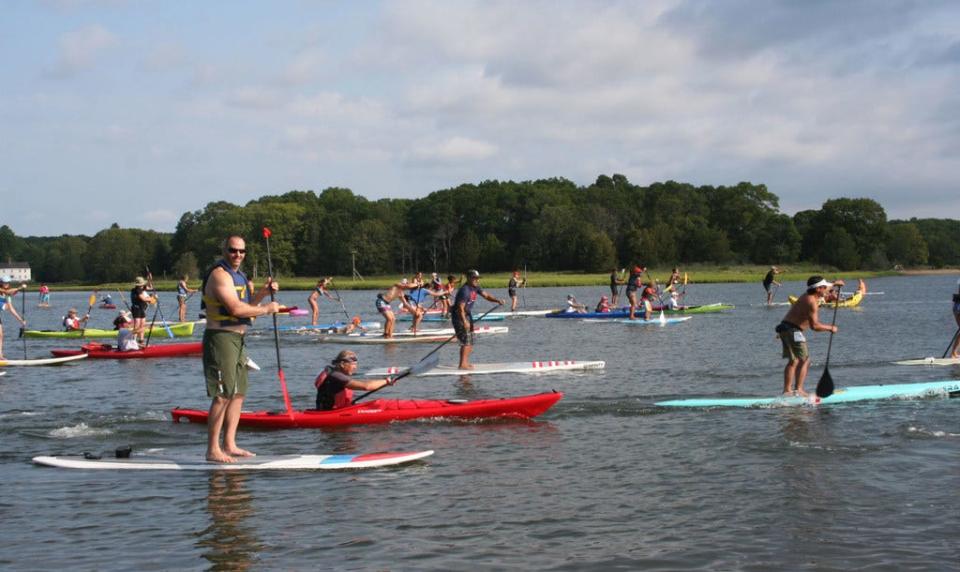Why RI's new life-jacket rule irks some paddlers, drawing accusations of 'Big Brother'
Some kayakers are unhappy with Rhode Island's new life-jacket requirement, accusing the state of playing "Big Brother" and trying to make money off paddlers with the threat of a fine.
"These are ridiculous Big Brother rules. I wear my white-water jacket most of the time, but the government mandating I have to protect myself is ridiculous," Jeremy Flanders of Warwick commented in a Rhode Island Department of Environmental Management Facebook post on the new regulation.
Patrick Powers, also of Warwick, wrote, "When it's 80 (degrees), I don't want to wear a life preserver in my kayak or canoe. That's ridiculous. What a money grab."
More: RI DEM announces new life-jacket requirements — what you need to know

The life-jacket requirement goes into effect Sunday and was put in place after three kayakers, none of them wearing life jackets, died in Rhode Island last year. The regulation includes canoes and paddleboards but not surfboards. Violators are subject to a $100 fine. Previously, life jackets were optional for those 13 and older.
The blanket regulation doesn't take into consideration the conditions under which the paddlers are using their vessels, argued Charles Lanigan.
"My wife and I like to kayak close to shore looking for wildlife, and I enjoy fishing," Lanigan said in an email to The Journal. "We are both responsible adults who can read the signs of the weather and water conditions. A few times we have been caught out in conditions that changed dramatically and we were forced to don our PFDs."
John Babineau of Richmond believes most drownings are due to "inexperience and bad decisions." A former Merchant Marine deck officer, Babineau has owned a power boat, three sailboats, a canoe and three kayaks.
He says he understands the importance of having safety equipment available and always brings a personal flotation device with him, but "I have never had to rely on it."
"Being on the water has always been a part of my life," Babineau said in an email. "The experience of kayaking without a cumbersome lifejacket impeding movement and overheating me on hot summer days has brought me many hours of happiness."
The new regulation has drawn some criticism, but most of the reaction, based on social media response, has been positive, according to Michael Healey, a spokesman for the state Department of Environmental Management.
Chuck Horbert, wilderness paddling chair for the Rhode Island Canoe & Kayak Association, is among those who reacted positively to the new rule.
"I'm fully behind this change. Folks always think 1) they're great swimmers, 2) they can put it on when they need it, 3) they'll never ever experience a heart attack, stroke or seizure on the water, and 4) someone will always be there to save them," Horbert wrote via his Facebook page, Paddle Across Rhode Island. "Too many of them find out they're wrong."
Horbert, of Scituate, led the Paddle Across Rhode Island in 2014, traversing the state by canoe from north to south.
Lifesaving measure or government overreach?
Some opponents of the new rule believe it's a sign of government overreach, according to Healey.
He said, "The belief about 'keeping the government out of my business' ignores or overlooks the fact that it is government employees who often risk harm responding to emergencies, who either rescue a paddler who wasn’t wearing a life jacket or recover a body, who notify next of kin that their loved one has died, and whose salaries are paid by the public."
"Deaths from drowning are preventable tragedies that can affect anyone in, on, or around the water," Healey said. "Wearing a life jacket is a simple life-saving technique."
In announcing the regulation, earlier this month, the DEM noted that canoes and kayaks are less stable than larger vessels, and most boating fatalities result from capsizing or falls overboard.
Capt. Michael Schipritt, boating safety coordinator for the DEM's Division of Law Enforcement said, “There is no time to put a life jacket on before a paddling accident. It’s like trying to buckle your seat belt before a car crash.”
Still, Babineau, the boater from Richmond, said, "I will likely end up selling my kayaks."
This article originally appeared on The Providence Journal: RI life-jacket rule angers paddlers who say it violates their rights

